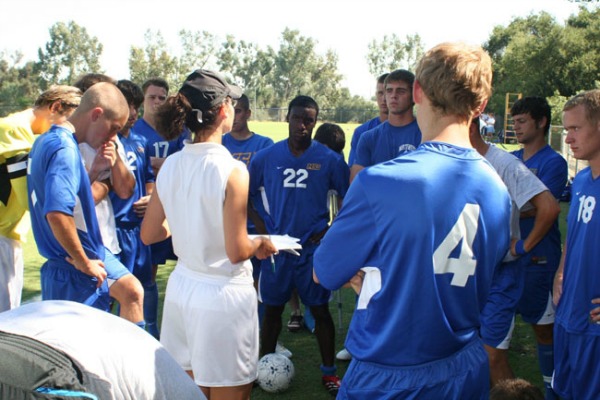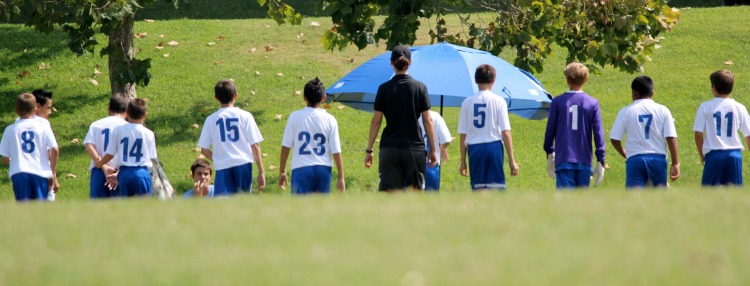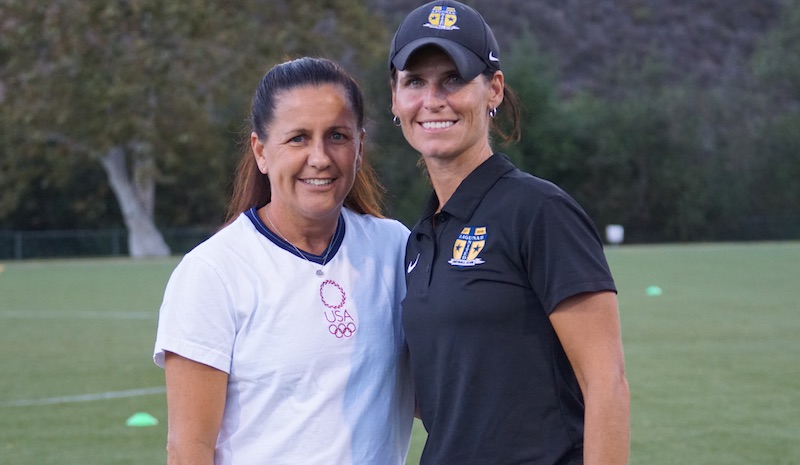Laguna United DOC Carrie Taylor on the Importance of Female Coaches
Where are all the great female youth soccer coaches? SoccerToday sets out to find the answer to that question in this series of articles about the importance of having female coaches at the youth soccer level. Today, Laguna United FC Director of Coaching Carrie Taylor shares her experiences and thoughts about being a woman in a decidedly male field – youth soccer coaches and club directors.
Don’t ever try to tell Laguna United FC Director of Coaching Carrie Taylor that women don’t belong on the soccer field. A former college (University of Michigan) and professional (United States Women’s Independent Soccer League and Women’s United Soccer League) player, Taylor has coached every level from club soccer to the USL W-League. She holds a USSF ‘A’ License and a US Youth Soccer National Youth Coaching License and in fact teaches the course to other Directors of Coaching. She has also been involved with the US Youth Soccer Olympic Development Program for more than fourteen years.
In addition to a recent stint with the Vancouver Whitecaps Women, Taylor’s coaching resume includes Assistant DOC at United Futbol Club, Director of Operations at Laguna Hills Eclipse and head coach of both men’s and women’s programs at College of Mount St. Joseph in Cincinnati, OH. In 2012 Taylor was named Cal South Developmental Coach of the Year. Along with her role as DOC at Laguna United, Taylor is Technical Director at Laguna Niguel Youth Soccer Association(LNYSA) where her duties include developing curriculum for all age levels and training volunteers.

SoccerToday interviewed Taylor to get her thoughts on coaching and the importance of having female coaches at the youth level.
Diane Scavuzzo: Why do you coach and what inspires you?
Carrie Taylor: It’s the best job in the world. Sometimes I wonder why I coach after dealing with an angry parent but I coach to give back to the game that has given me so much. I have made good friends, won a lot, lost a lot, and traveled the U.S. and the world via soccer. I have worked as a secretary, a high school teacher, and at UPS, but I am in my element when I am on the field coaching. My bank account may not agree, but that’s not important.
I can honestly say I have helped shape thousands of kids and helped them grow into better adults.
When a college player that you used to coach calls you when they are home and wants to take you for a coffee, you have been successful.
When a former player randomly sends you a message on Facebook and says, “Thanks, coach,” you have been successful.
When you have successes on the field via a win, or a great team play and you see your players smiling and celebrating, you can take that moment to smile to yourself and know that you have had an impact. When your players can lose with grace and display sportsmanship in heated moments, you know you are having a positive impact.
The players inspire me to keep going each day. I truly love my job.
Diane Scavuzzo: When and why did you join Laguna United FC?
Carrie Taylor: Two and a half years ago I ran into a coach and board member who had been in one of the national youth license courses that I had instructed. His organization had an opening for a DOC. It honestly was perfect timing, and I felt I was ready to take on the leadership position after many years in the game on various levels.
Diane Scavuzzo: What inspired you to become a coach?
Carrie Taylor: I came from Flint, Michigan, and we had this great summer program called the Flint Olympian and the CANUSA games. This was where you played in a summer league and then they picked an all-star team. You would travel to Canada one summer and stay with a host family one year, and then the next year the Canadians would come to us – thus the name CANUSA.
I played in it and then I started coaching soccer in that program while I was a sophomore in high school because two of my mentors, Mike Schultz and Tom Saxton, who was head women’s coach at Michigan State University, wanted me to get involved. I fell in love with coaching then. Once I went and played in college, I still was drawn to coaching, so I went on and got my coaching license while I was in college. I would go back in the summers in Flint and coach in the CANUSA program in the summer.
My senior year in college I had the choice of applying to medical schools, and it was then that I decided that my first love was soccer. So I set out to become a soccer coach. Along the way, I have had many great mentors including Linda Hamilton, who was my favorite coach; Peter Gaglioti, my first soccer club director; and Ralph Perez, my friend and mentor. There were also Dr. Ron Quinn, who gave me my first college assistant job; Hubert Busby Jr., a friend and colleague; and Shari Nomady, who isn’t a soccer coach but is a friend and businesswoman whom I respect greatly.

Diane Scavuzzo: What do you feel is the responsibility of a youth soccer coach in America?
Carrie Taylor: To teach players through soccer the qualities of teamwork, how to compete, good character, empathy for others, sportsmanship, communication skills, respect, task mastery, problem solving, leadership. Also to be a role model in a crazy world, to mentor kids, be an educator, a psychologist; the list goes on and on.
Our society is spinning out of control on the sports meter; we have too many coaches teaching bad behaviors in order to win. I look around and many times I am horrified by the behaviors I see from coaches and parents.
Diane Scavuzzo: Why do you think there are so few women coaches?
Carrie Taylor: It’s hard to say. I have given two talks at the US Youth Soccer Convention in the past on this topic, and there are no hard and fast answers.
One reason could be that the time commitment is hard if you have kids. Women have that role in the family as the caregiver, so the schedules are hard.
Also job opportunities for women in coaching were typically harder to get. I once interviewed for a club director job in 2008. I was asked in the interview by a board member, “As a female, how would you do this job?” It took all my professionalism not to respond with a few choice words.
Now there are many more female coaches, but in the past 10 years many females have given up on the profession for various reasons. No insurance for club coaches could be an issue. Some young coaches may be intimidated by the environment or get upset at the old boys’ network. You have to be willing to network, you have to find mentors, and you have to endure the grind.
Diane Scavuzzo: Why do you think female coaches have not been more welcomed in our youth soccer world?
Carrie Taylor: I think there is no one specific reason; maybe people don’t want to take the chance on a female coach. There is the grind, family reasons, and the lack of mentorship. I also think that many males may feel threatened by a quality female coach who isn’t afraid to have real opinions. Some of the men don’t want new opinions, and they specifically don’t want them from women.
It’s a reality that any time a female coach steps on the field they have to prove themselves a bit more to the parents and other coaches. It takes one session to prove yourself to the players, but it can be a lot longer process with the adults. I can’t tell you how many times people ask me when they first meet me if I am an administrator or a soccer mom. Not that there is anything wrong with those titles, but I have worked very hard to be a coach and have been successful at all levels.
I don’t know how many times the referees have gone up to my male assistant or my male team manager first and not me. It’s a bit disheartening to always have to show to new people that I know what I am doing.
Diane Scavuzzo: So do you think the youth soccer world is chauvinistic?
Carrie Taylor: Honestly, yes it is to a certain extent. Women still have to break down the “old boys’ network,” but once you prove your mettle and become to a certain extent “one of the boys,” they will take care of you and help you be successful.
Since moving to Cal South, I have had the opportunity to work with the likes of Ian Woodhead, Ralph Perez, George Kuntz, Martin McGrogen, Steve Hoffman, and Sean Roche. Those guys are champions for believing that a coach is a coach is a coach. They are my friends and colleagues who not only have helped me, but really believe in helping provide opportunities for women in coaching. So for every chauvinist I have encountered, there are good guys around that believe that a good coach is just that – a good coach no matter the gender.
Diane Scavuzzo: What are some of the differences between female and male coaches?
Carrie Taylor: Females tend to be less ego driven. I don’t ever see women bragging on websites how many U10 tournaments they have won. The female coaches I know are very team- and process-oriented, and less outcome-oriented. They do a great job relating to their players; they tend not to cut a lot of their club players and try to focus more on building team chemistry and less on the winning. Some parents don’t get this and in our area might see the female coaches as not as competitive, but they are really just a bit more focused on developing the whole child. There are plenty of male coaches that do this as well but it is not as common.

Diane Scavuzzo: How important do you think it is to have the same gender coach if you are a girl or a boy?
Carrie Taylor: First and foremost, I think it’s important to have a good coach. I believe that female coaches relate a bit differently to their players. They tend to focus a bit more on getting to know each player a bit better; the relationships are a bit more important. Having strong female role models that the girls can strive to emulate is important. I feel seeing women in leadership roles helps young players see that it’s okay to be a leader, it’s ok to be strong, and it’s ok for girls to do what the boys do.
Diane Scavuzzo: Do you have other female coaches on your club?
Carrie Taylor: When I arrived we had one female coach, Kelly Wherry. She is going into her third season at the club. I just recently have hired Nicole Farley, Megan Tharp and Dyanne Anderson to add to the staff. Kelly and Megan are both school teachers and Kelly coaches high school at Mater Dei. Nicole is a full-time coach and also coaches with me at Dana High School as the fr/so coach. Dyanne is currently a pro player with the Houston Aces and my varsity assistant at Dana.
Now that I am in a position as a DOC to hire coaches, I think it’s important to give back to my female counterparts and help open up opportunities.
I want to be a mentor for any up and coming coach, not just females but I think it’s important as a woman to help be a mentor to younger women coaches. Females need to be each other’s allies.
Diane Scavuzzo: Who do you think is the best female coach in the world?
Carrie Taylor: I think that Pia Sundhage has had a great run on the national scene. I don’t know her personally, but have heard that she was great at focusing on the positives, team chemistry and highlighting the strengths of the players.
In the US, the key women coaches that I respect are April Henrichs, Jill Ellis, Leslie Gallimore, Janet Rayfield, Lori Walker, Amanda Cromwell, and Becky Burleigh to name a few. They have had longevity in the game, and have helped mentor up and coming coaches along the way. My favorite female coach that I played for was Linda Hamilton. She was tough, but found a way to let us have fun. Even in college, it has to be fun; you have to enjoy what you are doing.

Diane Scavuzzo: Who is your favorite male coach?
Carrie Taylor: My favorite male coach is Ian Woodhead from Santiago Canyon College. I never played for him, but I have worked with Ian as a colleague instructing coaching licenses. He doesn’t know this, but I wish I would have played for him. He has a way about teaching the game. His players are all educated in all the elements of the game, and he produces many female coaches from his former players. He produces winning teams and more importantly winning people. He makes me wish I could go back and play for him.
Diane Scavuzzo: Finally, what traits does a female coach need to survive and thrive?
Carrie Taylor: Many of the things that I learned as a player on the soccer field are traits you need to succeed as a female coach.
A female coach needs self confidence. Women are hard on themselves and usually are their own biggest critics. You can’t be afraid of what the naysayers are saying about you. If they are talking about you, you must be doing something right because you are relevant.
You also need a voice. Don’t be afraid to stand up for what you believe in or have yourself heard. Don’t back down from people who are afraid of you. Keep battling for what you believe in.
Along with that, you have to have thick skin. Don’t be hurt by critical feedback, or people who try to rate you on their scale of what it means to be a “good female coach”.
Finally, you have to have perseverance: It’s critical for long term success. Don’t give up even in a tough situation. Find a mentor who can help you along your journey.
All photos courtesy of Carrie Taylor
Originally published on March 17, 2014:





